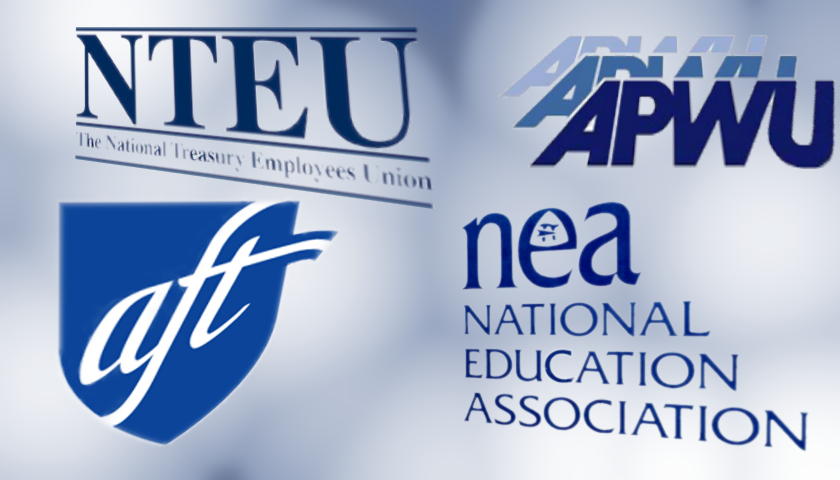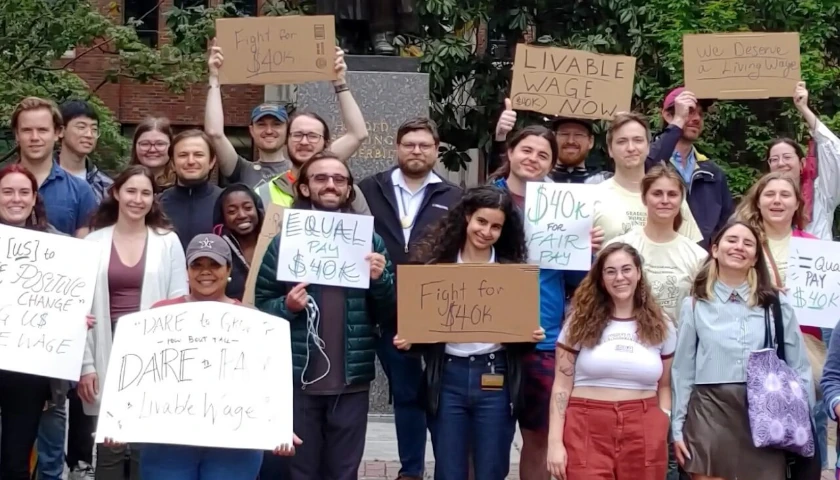By J.C. Bowman and Justin Owen
This week is National Employee Freedom Week. From August 20 to 26, we celebrate Americans’ right to work freely of compulsory union representation, as well as every citizen’s right to join a union if he or she believes it is in his or her best interest. However, for Tennessee teachers, that freedom comes with some limits. A simple glance at the half page of fine print on Tennessee’s National Education Association affiliate’s membership application offers troubling music for union members’ ears.
First up is the “Hotel California” clause. You can check out of the union anytime you like, but you can rarely leave. In order to withdraw from your union, you must provide written notice of termination to multiple entities prior to September 1 each year (how far in advance the notice can be sent is unclear). Otherwise, you are locked in for an entire year. And the key statement on the application form is revocation will only be acted upon in accordance with the established policy of the union board. That’s right, the union leadership decides if you get out of the union based on their policies, not based on your preference.
Next up in rotation is the union’s “Mo’ Money, Mo’ Problems” feature. Upon joining, teachers agree that their union dues may increase each year and these higher dues can be withheld without further authorization. If unions believed so strongly in their ability to represent teachers well, they would have no qualms with returning each year and justifying any increase in membership dues. Instead, they get a blanket approval up front, lock teachers in with a complicated and vague cancellation policy, and then jack up their dues when teachers can do little about it.
Then comes how they collect teachers’ dues. Let’s call this one “Taxpayer Blues.” Through dues deduction agreements with local school districts, unions actually sit back and let taxpayers fund their dues collections. Imagine if Comcast convinced your county commission to deduct your monthly bill from your property taxes, saving it millions of dollars in collection fees and overhead. That’s effectively what the union has done by convincing school districts, on the taxpayer dime, to collect dues on their behalf. In a legislative committee hearing on this subject, Professional Educators of Tennessee offered to pay a small, reasonable fee to cover the cost of dues collection in the few districts in which they are permitted payroll deductions, but this idea was rejected by their union counterparts.
Finally, it’s what they do with those dues monies that is most troublesome. We will call it their Dirty Little Secret. Unless a teacher proactively tells the union “no” up front, a portion of his or her dues will automatically be allocated to the union’s political action committee. It is then used for a myriad of political activities, including endorsing candidates and taking sides in elections, regardless of whether the teacher agrees with that activity or supports that candidate. If unions were proud of the positions they took and knew teachers would support them all, they wouldn’t need such a sleight of hand to fund their political operations. Professional Educators of Tennessee does not contribute to political campaigns, parties or PACS, nor endorse candidates. If unions want to engage in political activity, they should collect contributions from individual donors—just like any other political candidate or entity.
The real question to ask: Why are Tennessee taxpayers subsidizing union political fundraising through a publicly funded payroll system? It is likely some of those dollars end up in the pockets of politicians and other non-education causes against the wishes of union members.
The teachers union is one of the nation’s largest political spenders. How much longer will unions be permitted to take deductions out of public employees’ paychecks, even if voluntarily, for campaign efforts? Why must taxpayers subsidize that effort? The state should level the playing field for all citizens by protecting taxpayers and separate government employment from payroll deductions for political purposes.
During National Employee Freedom Week, we should be thankful educators have every right to join or not join a union in our state, and even support political causes and candidates with their own money, but they shouldn’t be hoodwinked into doing so by the union. By embracing employee freedom for teachers, hopefully unions can begin to sing a new tune.
[pdf-embedder url=”https://tennesseestar.com/wp-content/uploads/2017/08/FinePrint-teacher-unions.pdf”]
– – –
J.C. Bowman is executive director & CEO of Professional Educators of Tennessee, a non-partisan teacher association headquartered in Nashville, Tennessee. Justin Owen is president & CEO of the Beacon Center of Tennessee, the state’s premier free market think tank.






Taxpayers do NOT pay union dues for teachers. TEA members in many districts can have their dues deducted from their paycheck. In my district, I can also have payroll deduct United Way donations, elective insurance coverages, and gym membership. Does that mean taxpayers are subsidizing United Way or my gym? No, it just means that my payroll department offers that convenience. This statement is very misleading, almost ti the point if lying: “Through dues deduction agreements with local school districts, unions actually sit back and let taxpayers fund their dues collections.” Disappointing that you cannot make your point without such dishonest tactics.
Why does any teacher’s union exist? Are teachers unable to speak for themselves? I would hope that “professionals” like teachers have the mental capacity to negotiate contracts. I was self employed for the majority of my professional career. I did not require a union or association to succeed.
Because every politician is the child of a teacher and therefore they know everything there is to know about teaching children and write the laws to reflect that. That is why teachers need to speak in one united voice. Also, since public education is inherently political, educators need to be involved in the process.
I do not disagree that teachers – and all citizens – need to be engaged in the efforts to managed public education. As a non-teacher, I have not observed the teachers unions doing anything positive to influence the curriculum. So what exactly are these watchdogs doing for the public good? In my opinion fighting for higher wages and better benefits do not fall in to the category
The union doesn’t write curriculum. That is the state’s prerogative, and the state is answerable to the people. The union represents its members. Period. That is why they pay dues. And seeing as how PET is as much a “union” under Tennessee law as TEA, Dr. Bowman’s article reeks of hypocrisy. PET sits at the table for collaborative conferencing and testifies before Senate and House committees, just like TEA. It provides representation for its members, just like TEA. What it does that TEA doesn’t do is sell out it’s members for political gain. All you have to do is look at PET’s positions on tenure, bargaining, and the new licensure rule to see just how profoundly they have screwed over their members and other teachers in Tennessee.